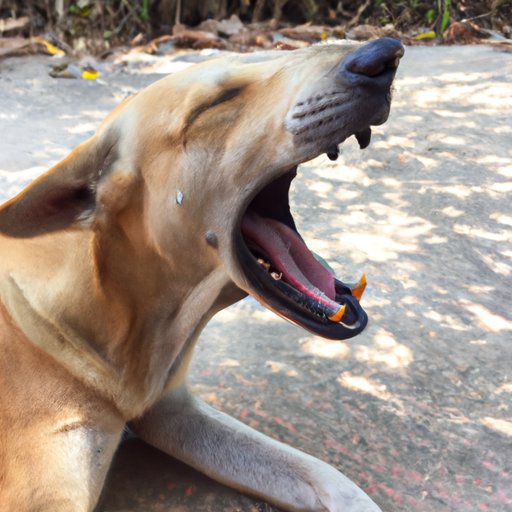Introduction
If your dog is breathing rapidly while sleeping, it can be concerning for pet owners. This article will explore the various causes of why a dog may be breathing rapidly while sleeping, as well as different methods to help reduce this issue. It will also look into the link between anxiety and rapid breathing in dogs, and provide advice on how to help your dog sleep better.

Causes and Signs of Rapid Breathing in Dogs While Sleeping
Rapid breathing in dogs while sleeping can be caused by a variety of factors. Physiological causes such as excitement, pain, or infection can all lead to rapid breathing in dogs while sleeping. In addition, rapid breathing can be a sign of a more serious medical condition such as sleep apnea. The following are some signs to look out for when determining if your dog is experiencing rapid breathing while sleeping:
- Excessive panting or heavy breathing
- Wide-eyed and alert appearance
- Restlessness or agitation
- Licking lips or yawning excessively
- Frequent shifting positions

How to Tell if Your Dog is Experiencing Sleep Apnea
Sleep apnea is a serious medical condition where the airway becomes blocked and breathing becomes shallow or stops completely. If your dog is having difficulty breathing or snoring loudly during sleep, they may be suffering from sleep apnea. Other symptoms associated with sleep apnea include excessive panting, restless sleep, and frequent waking up during the night. If you suspect that your dog may be suffering from sleep apnea, you should consult your veterinarian for further diagnosis and treatment options.
What to Do When Your Dog’s Breathing Becomes Rapid During Sleep
When your dog’s breathing becomes rapid during sleep, there are a few steps you can take to help. First, check their environment to make sure it is comfortable and not too hot or cold. Next, provide comfort and reassurance by talking softly or offering a toy or treat. Finally, if the rapid breathing persists, consult your veterinarian to rule out any underlying medical conditions.
Understanding the Link Between Anxiety and Rapid Breathing in Dogs
Anxiety can be one of the main causes of rapid breathing in dogs while sleeping. Common triggers of anxiety in dogs include loud noises, unfamiliar people or animals, and being left alone. To help reduce anxiety in your dog, make sure they are getting enough exercise, have plenty of toys and activities to keep them occupied, and have a safe space to retreat to when feeling overwhelmed. Additionally, providing calming aids such as treats or supplements can also help reduce anxiety levels.

Help Your Dog Sleep Better and Reduce Rapid Breathing Through Exercise and Training
Exercise is an important part of maintaining good health for both humans and animals. Regular physical activity helps to reduce stress and burn off excess energy, which can help your dog sleep better and reduce rapid breathing. In addition to exercise, certain types of training such as obedience, agility, and nosework can also help to reduce anxiety and improve overall behavior. These activities can help to keep your dog mentally stimulated and can help to reduce boredom, which can lead to restlessness and rapid breathing.
Conclusion
In conclusion, rapid breathing in dogs while sleeping can be caused by a variety of factors including physiological causes, sleep apnea, and anxiety. To help reduce rapid breathing, pet owners should check their pet’s environment, provide comfort and reassurance, and consult a veterinarian if necessary. Additionally, providing regular exercise and mental stimulation can help to reduce anxiety and improve sleep quality. By understanding the causes and taking the proper steps, pet owners can help their furry friends sleep better and reduce rapid breathing.


